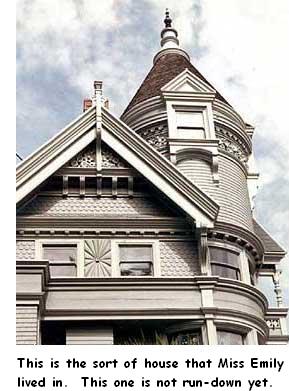
I can't read Faulkner's "A Rose for Emily" without thinking about my wife's reclusive and gloomy Uncle Tommy. Not only did his life parallel Miss Emily's in many ways, but what we learned after his death about his military career and about a mysterious ex-girlfriend named Mary Elsie helped us to understand and sympathize with that difficult old fellow. When a commentator on Faulkner's story wrote that "Miss Emily did not choose weirdness as much as weirdness chose her," he might just as well have been talking about Uncle Tommy as about Emily Grierson.
Like Emily, Uncle Tommy spent the last years of his life living alone -- except for his five cats -- in a decaying house in a decaying neighborhood. All through that house were military souvenirs from his service during World War Two, models of all sorts of World War Two aircraft, and books and magazines about every aspect of flight during that war; and in every closet and under every bed were boxes of old documents, letters, and photographs gathering dust and mold. Also, much like Emily, he was mostly a recluse and annoyed most members of our family by avoiding family gatherings. At Christmas, for example, he would spend the night of the family Christmas party alone, drinking bottled Cokes and eating peanut butter sandwiches. The younger nieces, nephews, and cousins were convinced he was weird in much the same way as the people of Jefferson thought Miss Emily was weird. When he died, these same relatives all came to visit his house, most of them for the first and last time, drawn there by curiosity about our peculiar old uncle.

Since my wife was Tommy's only heir, she and I also inherited the task of cleaning out his house and preparing it for sale. As I was assembling all the military souvenirs, I came across a box that contained about forty photos of dashing young Tommy in the uniform of a flight school trainee, the log book he had kept as a student pilot, and his dress uniform cap. There was also a letter from the commander of the flight training program which included the following words: "dropped from the pilot training program" and "reassigned to the quartermaster training center at. . ." In a flash I realized what had happened. The young man who had a quaint romantic notion of himself as a heroic pilot had failed to complete flight school and would pass the war years as a clerk in a supply depot far from the fighting. It was a failure that had haunted him for half a century.
It was my wife, however, who made the most poignant discovery. Under Tommy's bed, she found a shoebox full of photos and newspaper clippings. Some of the photos were of Tommy and a girl, and some of them were of the girl by herself. My wife immediately remembered the girl as Mary Elsie, the petite little blonde beauty that Tommy had dated for several years after he returned from the war. My wife also remembered that Big Mamma -- Tommy's mother and my wife's grandmother -- had consistently discouraged Tommy's romance and that she was always cold toward Mary Elsie whenever they crossed paths. As we examined the news clippings, it became clear what had happened. The faded announcements of Mary Elsie's engagement and wedding made it plain that, just like Emily, Tommy had lost the chance for normal love because of a domineering parent. Tommy had lived alone with his mother until her death, but Mary Elsie had gone on to a more normal life without him. Years later Tommy married someone else, but that shoebox under the bed told us that Tommy had never forgotten Mary Elsie.
The pictures hidden under the bed are not as strange as the corpse that rotted on the bed in Emily's upstairs bedroom. Nevertheless, poor old Uncle Tommy, the frustrated warrior and the disappointed lover, still seems a bit old-fashioned, strange, and even weird to me, but -- just like Emily Grierson -- it seems that he was forced into weirdness. He did not choose to be strange. Life chose that role for him.